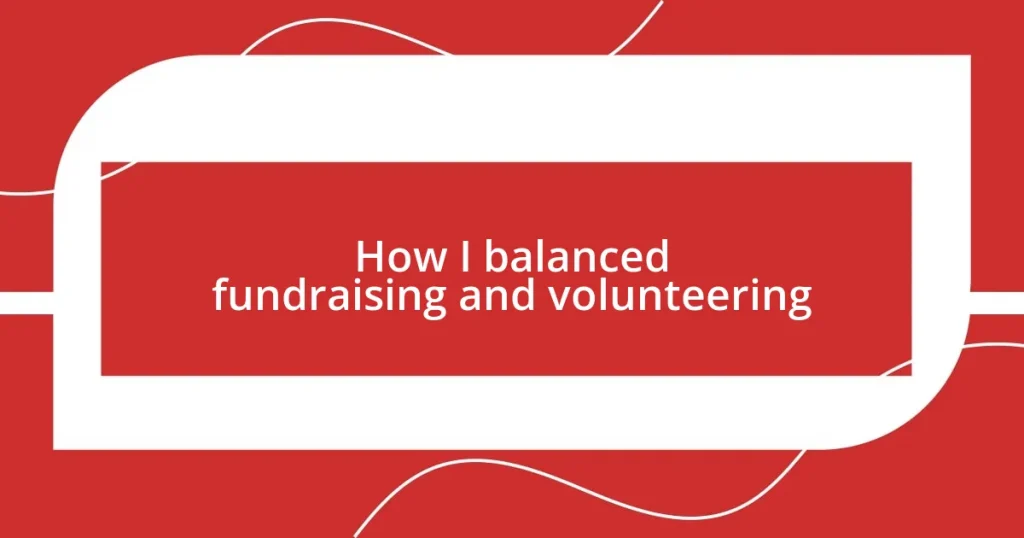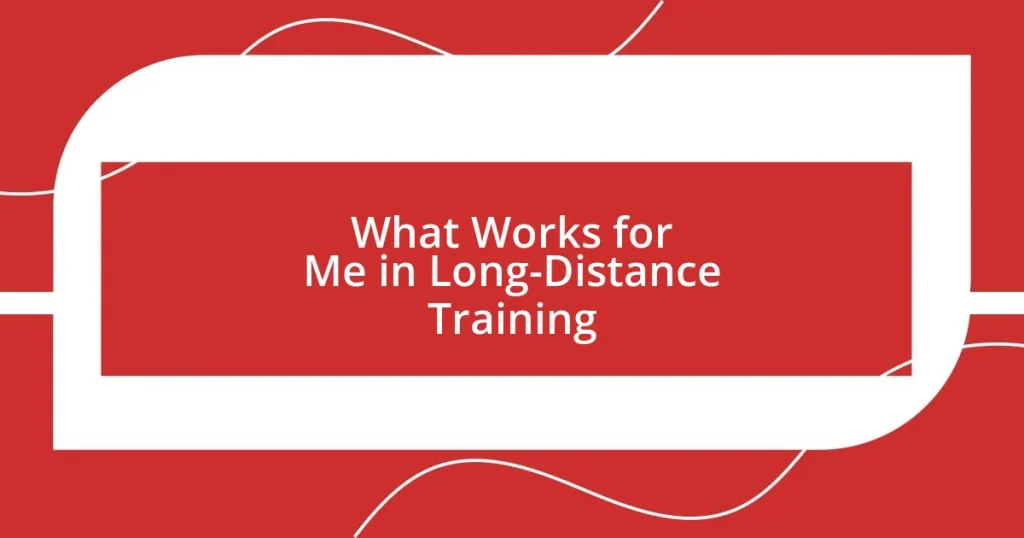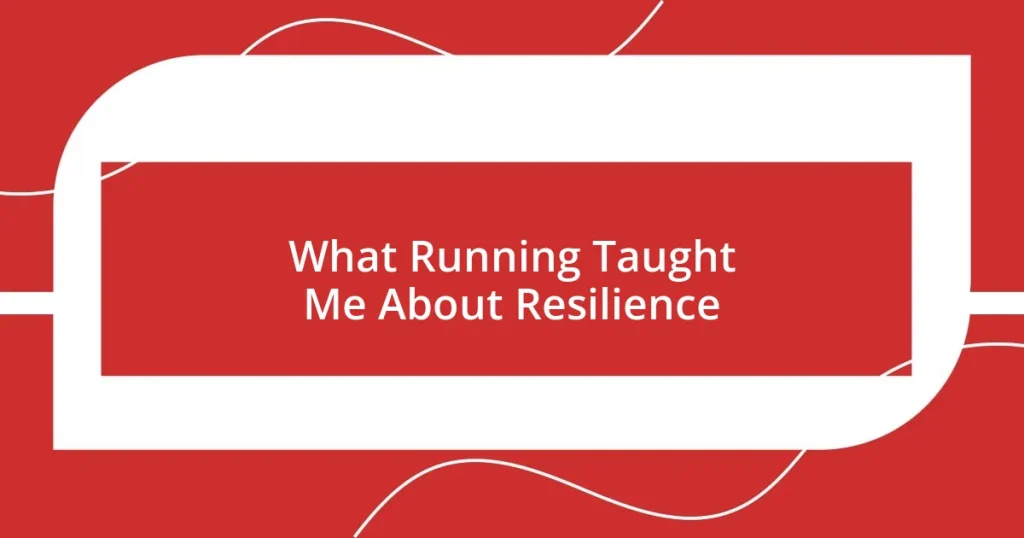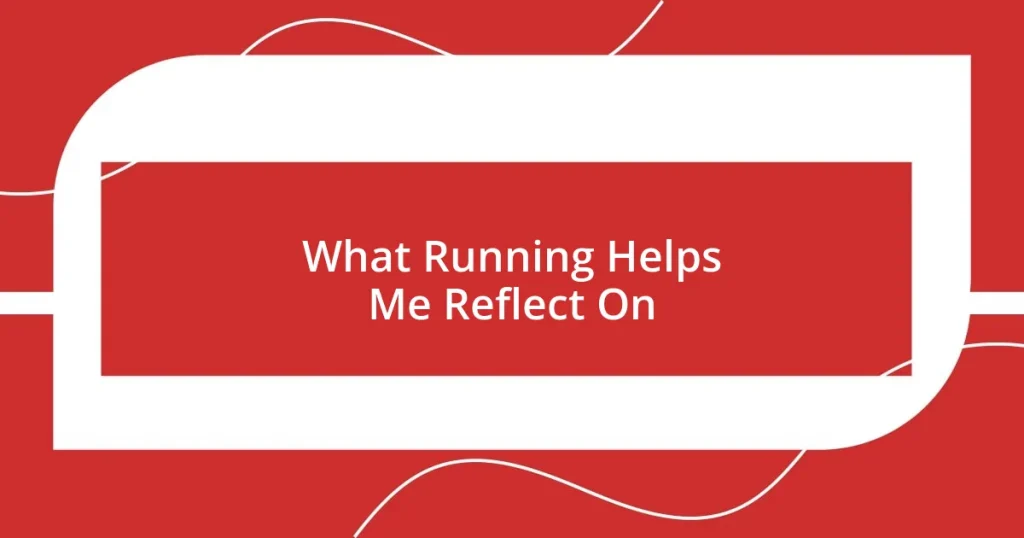Key takeaways:
- Volunteers are essential for successful fundraising, fostering community engagement and enhancing event vibrancy.
- Balancing fundraising and volunteering leads to sustainable support, diverse perspectives, and enhanced visibility for causes.
- Time management strategies like prioritization, delegation, and setting boundaries are crucial for effectively handling both tasks.
- Building a support network through personal connections and online platforms amplifies the impact of fundraising efforts.
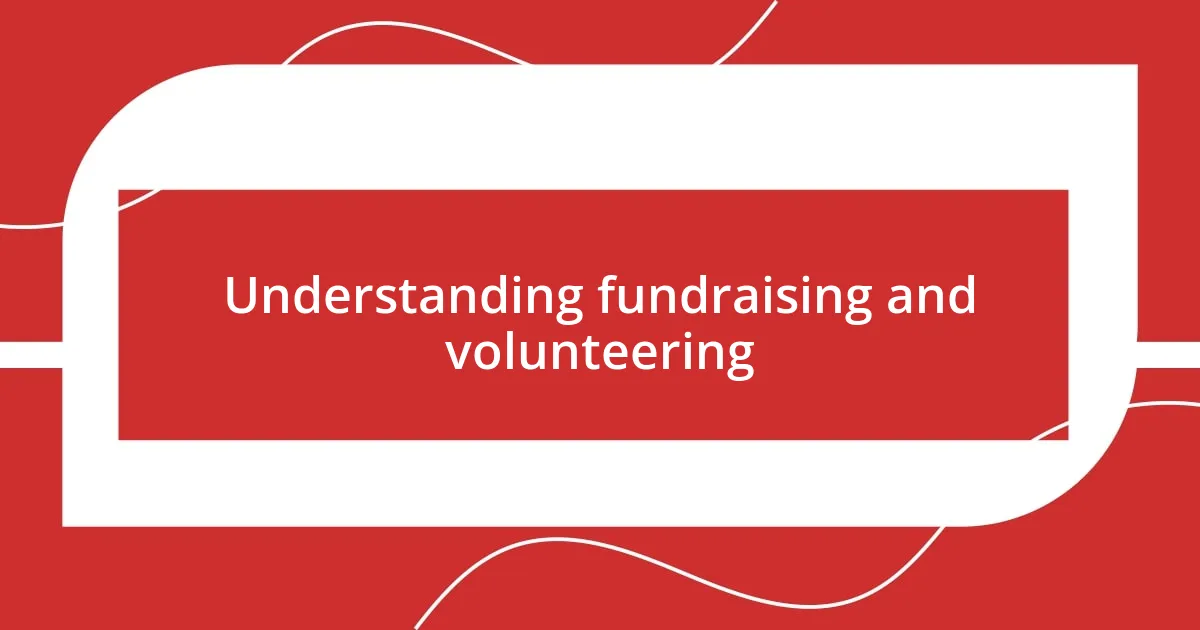
Understanding fundraising and volunteering
Fundraising and volunteering are deeply intertwined, yet they each serve distinct purposes. From my experience, I often find volunteering to be the heart of a community, where individuals come together to support a common cause. Have you ever felt that rush of purpose when you’re working alongside others, knowing that you’re making a tangible difference? That sense of connection truly fuels the spirit of fundraising.
When I first started organizing fundraising events, I quickly realized how vital volunteers were to my success. They weren’t just helping; they were setting the stage for genuine community engagement. Remember that time when a group of volunteers rallied together for a bake sale? The laughter and energy in the air turned what could have been a simple event into a vibrant gathering. Each person brought their unique strengths, from baking skills to charisma, showing how collaborative efforts can amplify impact.
Understanding the nuances of both fundraising and volunteering requires recognizing the balance between ambition and altruism. I often reflect on how my own motivations shifted over time. Initially, I was focused solely on dollar signs, but with each volunteering experience, I learned that the relationships I built were just as valuable. How can we ensure that fundraising doesn’t overshadow the heart of our work? It’s about nurturing both elements to create a holistic approach that yields sustainable support and genuine community connections.
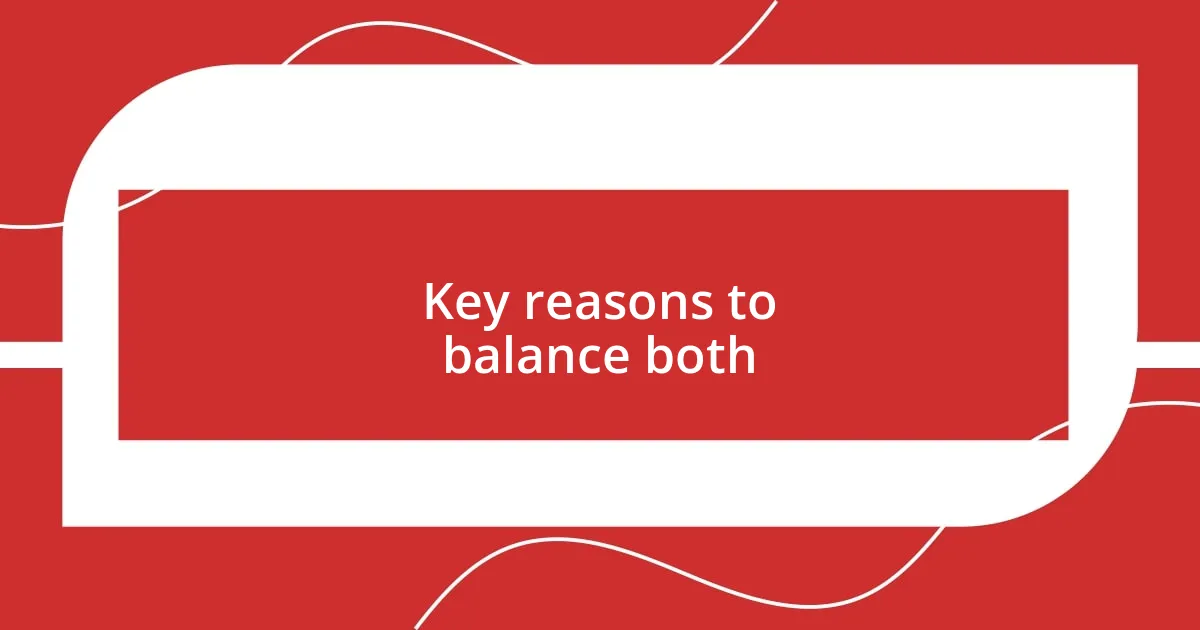
Key reasons to balance both
Finding equilibrium between fundraising and volunteering is essential, and I’ve seen firsthand how these two elements complement each other. When I was deep into organizing a fundraising gala, I noticed that the more I engaged volunteers, the more vibrant the event became. It was illuminating to see how their enthusiasm not only attracted attendees but also sparked genuine connections among guests, which in turn enriched the fundraising effort.
Here are a few key reasons to maintain balance between fundraising and volunteering:
- Community Building: Volunteers create a sense of belonging, making your cause more relatable to others.
- Sustainable Support: A mix of both fosters a loyal donor base over time; relationships built through volunteering often lead to financial contributions.
- Diverse Perspectives: Involving volunteers can bring fresh ideas and insights, enhancing the overall effectiveness of your fundraising strategies.
- Enhanced Visibility: A dedicated volunteer network can increase awareness of your cause, bringing in new supporters who might contribute financially.
I still remember the joy of organizing a community cleanup where volunteers not only beautified the area but also left with stories to share. The small talk between cleaning sessions transformed strangers into supporters, proving that investing time in human connection pays off beyond monetary contributions.
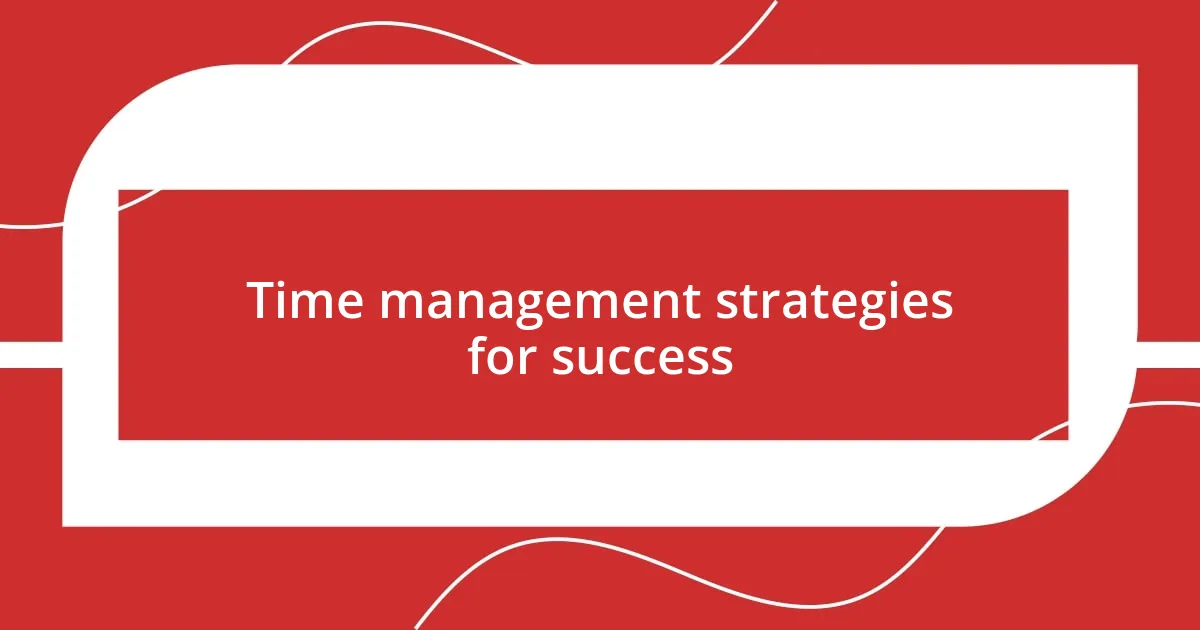
Time management strategies for success
When it comes to managing my time effectively in fundraising and volunteering, I’ve discovered that prioritizing tasks is key. I often create a simple, yet structured daily to-do list, focusing on what must be completed first. I remember one hectic week when I had to juggle an upcoming fundraiser and a charity event. By breaking down my tasks and setting clear priorities, I was able to address critical items without feeling overwhelmed.
Another strategy that has worked wonders for me is delegating responsibilities. I find that engaging with my volunteers and allowing them to take ownership of specific roles not only helps me manage my time but also empowers them. I recall a particular fundraising event where I entrusted a volunteer with managing social media promotions. Not only did it free up my time, but it also gave her a sense of pride and involvement, resulting in a more dynamic online presence for the event.
Lastly, I’ve learned the importance of setting boundaries. Balancing multiple commitments can lead to burnout, so I consciously carve out time for myself to recharge. During a particularly busy fundraising season, I made it a point to step back and dedicate time just for self-care. I took walks in nature, which rejuvenated my mind and spirit, allowing me to return to my work energized and ready to tackle challenges head-on.
| Strategy | Description |
|---|---|
| Prioritization | Creating a daily to-do list to focus on essential tasks first. |
| Delegation | Involving volunteers in specific roles to share the workload and empower them. |
| Setting Boundaries | Carving out personal time for self-care to avoid burnout. |
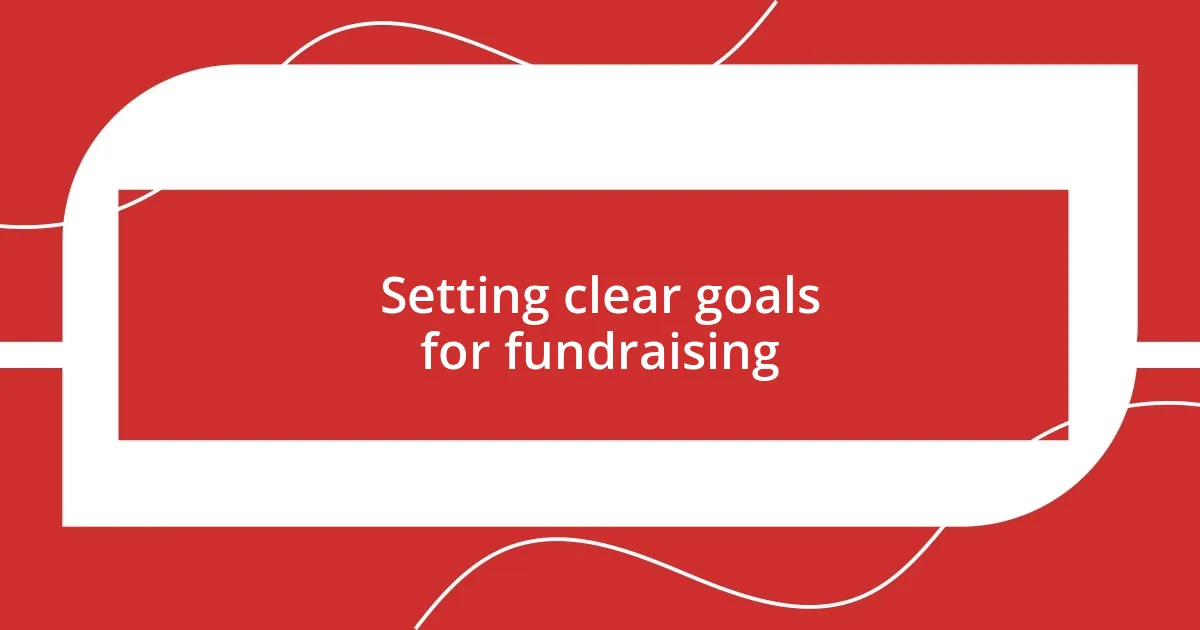
Setting clear goals for fundraising
Setting clear goals for fundraising is crucial to achieving success. Without a defined aim, it’s easy to lose focus and become overwhelmed. I remember planning a book drive for a local school and setting a clear target of collecting 1,000 books within a month. By establishing this goal, we could track progress and motivate volunteers, creating excitement around the mission.
Breaking your goal down into smaller, actionable steps can also make a significant difference. For instance, once we had our target, we divided responsibilities among volunteers—some focused on outreach to libraries, while others engaged local businesses for donations. This not only made the workload manageable but also fostered a sense of teamwork. Have you ever felt the satisfaction of checking off tasks as you move closer to a goal? There’s something profoundly rewarding about seeing contributions, big or small, add up.
Lastly, I’ve understood the importance of flexibility in goal setting. As the book drive unfolded, we quickly realized that social media outreach generated much more engagement than we anticipated. We adapted our strategy to increase our online presence. This taught me that while clear goals are essential, being open to adjustments can lead to even greater success. Isn’t it exciting when a plan unfolds in unexpected ways? It reinforces the idea that effective fundraising is not just about numbers; it’s a dynamic journey that thrives on creativity and adaptability.
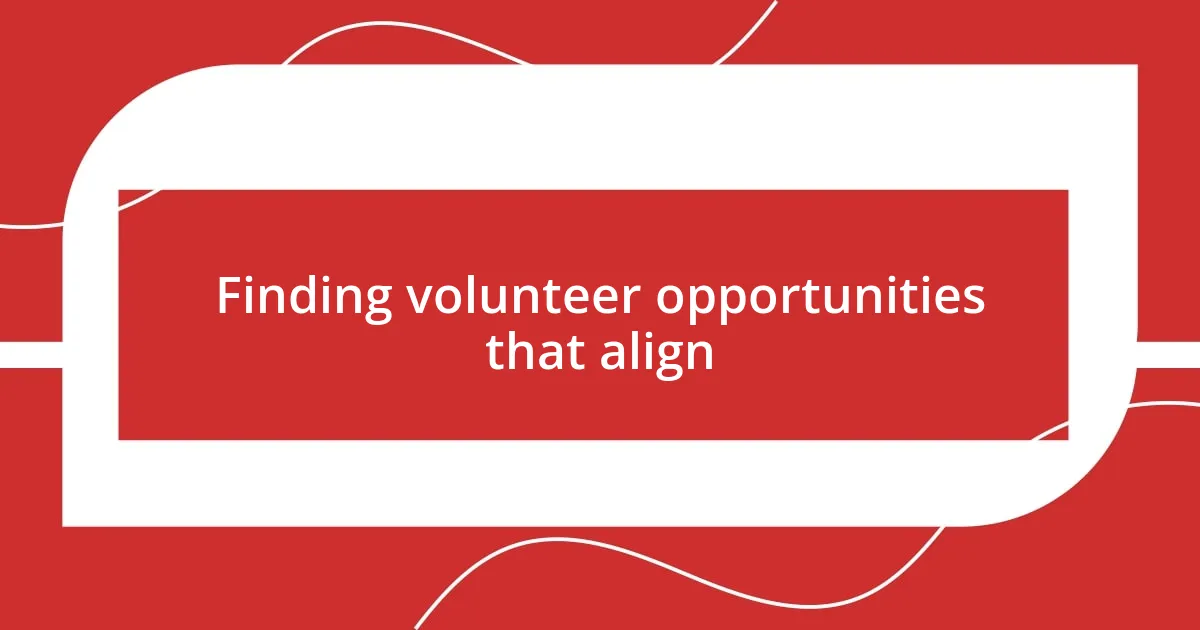
Finding volunteer opportunities that align
Finding volunteer opportunities that align with your interests and values can greatly enhance your experience in both volunteering and fundraising. For instance, I recall joining a local environmental group that was deeply passionate about ecological sustainability. Not only did I connect with like-minded individuals, but this alignment fueled my enthusiasm for participating in community clean-up events, making the efforts feel meaningful rather than like just another task on my list. Have you ever experienced that electric moment when passion meets purpose?
Moreover, researching causes that resonate with your own beliefs can lead to fulfilling volunteer engagements. I once stumbled upon a mentorship program that focused on empowering at-risk youth. It matched my commitment to education and personal growth perfectly. Volunteering in that capacity not only allowed me to contribute positively but also provided me with valuable insights into the challenges faced by the youth, enriching my understanding as a fundraiser. Isn’t it amazing how finding the right opportunity can open your eyes to new perspectives?
Lastly, I’ve learned that visiting local non-profits’ websites and attending their events can provide clarity on what they stand for and how you can contribute. I remember attending an open house for a shelter and realizing firsthand how passionate the staff were about their mission. Meeting them opened my heart to what was truly at stake, and that connection ultimately motivated me to dedicate more time to fundraising for their initiatives. Engaging with organizations on a personal level can often lead to the most rewarding experiences. Have you ever found a personal connection that transformed your volunteering journey? It makes all the difference.
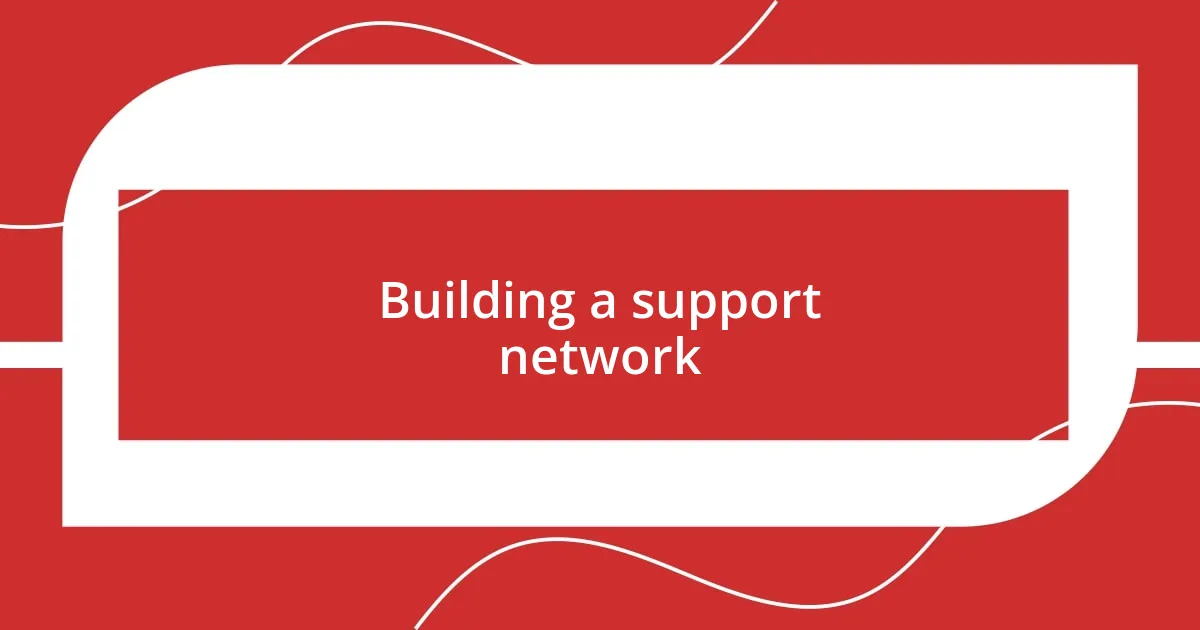
Building a support network
Building a support network is one of the most enriching parts of my fundraising and volunteering journey. I vividly recall reaching out to friends and family before launching a raffle for a charity event. The genuine excitement they showed sparked a chain reaction—each person wanted to help in some way, whether it was donating items for the raffle or spreading the word on social media. Have you experienced that magic when your enthusiasm ignites others? There’s a real sense of community that forms when people come together for a shared cause.
Connecting with others in the nonprofit space has also been transformative. I remember attending a local volunteer fair, where I met seasoned volunteers who were eager to share their insights. They offered not just advice but became mentors, guiding me through the intricacies of organizing events effectively. Forming these bonds was invaluable. It made me realize that building a support network isn’t just about seeking help—it’s also about giving back. Have you ever thought about how much you can learn from those who have walked similar paths?
Additionally, I found that online platforms can serve as powerful tools for networking. I joined local Facebook groups focused on philanthropy, which led to numerous opportunities for collaboration. Through these connections, I discovered projects that needed volunteers and those that were seeking fundraising partners. When you tap into these communities, the shared knowledge and resources can make a massive difference. Isn’t it empowering to know that there are so many people out there who share your commitment to making the world a better place? This turned networking into a pathway for new friendships and collaborative ventures, amplifying my impact.
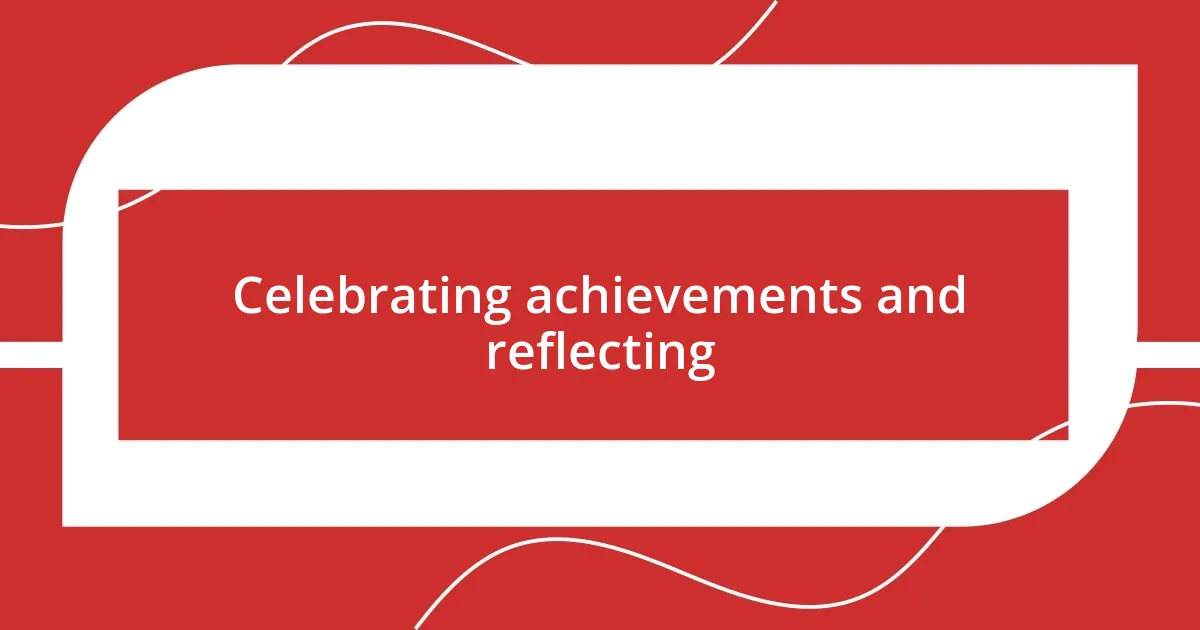
Celebrating achievements and reflecting
Celebrating achievements is a wonderful practice that can recharge your spirit and commitment to your work. For me, one of the most memorable celebrations occurred after reaching a fundraising goal for a local animal shelter. We hosted a small gathering to acknowledge everyone’s contributions. The joy on the volunteers’ faces reminded me that our combined efforts had a tangible impact—seeing the animals thrive and finding homes was incredibly rewarding. Have you ever felt that rush of gratitude when your community comes together to make something great happen?
Reflection plays a crucial role in understanding our journey and the lessons learned along the way. After each project, I take time to look back and assess what worked and what didn’t. I remember one fundraising event where I initially struggled with logistics, feeling overwhelmed. But upon reflection, I realized those challenges transformed into opportunities for growth, leading to more efficient planning in the future. Isn’t it fascinating how a moment of difficulty can turn into a profound learning experience?
Finally, sharing your achievements not only celebrates success but can inspire others to contribute as well. I once wrote a blog post detailing the impact of our efforts for a community garden project, highlighting individual stories of volunteers and beneficiaries alike. The response was heartwarming—many people reached out, wanting to get involved or support future initiatives. Isn’t it remarkable how our personal stories and successes can resonate so deeply with others? In celebrating and reflecting, we create a ripple effect that encourages a cycle of giving and engagement.










